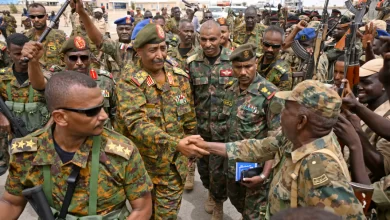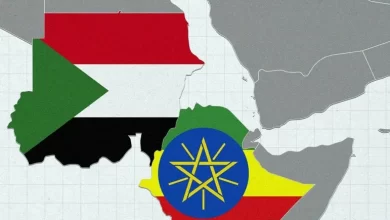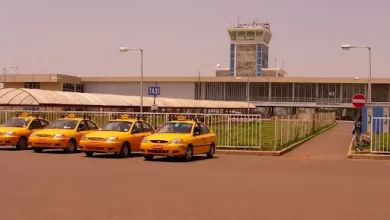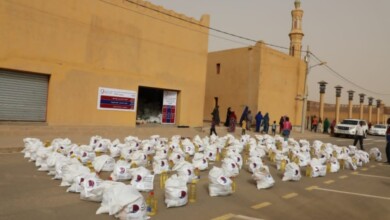Ministerial Replacements in Sudan: Marketing Al-Burhan’s rule is an impossible mission
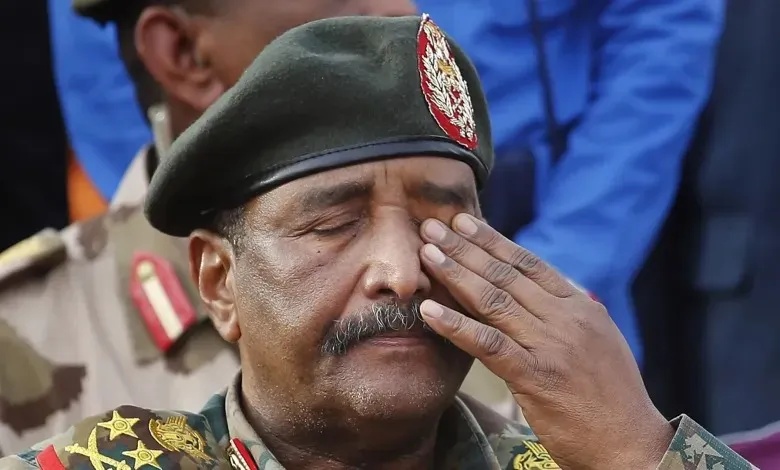
The sheer number of assignments and replacements indicate the inability of the de facto government to carry out its duties, and the existence of major confusion in its cabinet.
The Commander-in-chief of the Sudanese Army, Lt. Gen. Abdel Fattah Al-Burhan, is attempting to market the stability of his rule through ministerial appointments and replacements, but the ministers who were appointed on Sunday, regardless of their capabilities and experience, will find that marketing a regime that lives on crises is an impossible mission internationally, whether diplomatically or in the media, as well as domestically in light of the difficult circumstances that the Sudanese are living in, including displaced persons and refugees.
Al-Burhan seems to find pleasure in replacing ministers, senior officials and ambassadors from time to time, which makes him feel like he is “the master of his fate”, as if he still controls the reins, despite losing about (70%) of the country’s territory, that are currently under the Rapid Support Forces’ control, after the outbreak of war between both parties.
General Al-Burhan made governmental changes in four ministries: Foreign Affairs, Culture and Information, Commerce, and Endowments (Awqaf). The new ministers were appointed by assignment and not in consultation with any political party, a tradition that has been followed since the military coup and the overthrow of the civilian government in October (2021), which emphasizes their need to be loyal to the one who assigned them, as he is capable of dismissing them as well at any given moment.
The sheer number of assignments and replacements indicates the inability of the de facto government to carry out its duties, and the existence of major confusion in its cabinet, and no one knows exactly whether it aims to alleviate the suffering of citizens or to seek a ceasefire and search for negotiated solutions.
It has become entrenched in the minds of many that the continuous changes in the composition of the government are evidence of failure, and that Al-Burhan is trying to convey that he possesses real authority, while -in reality- there are various regions of the country outside of his authority, which in turn detracts from the importance of any change he makes. Perhaps the Ministry of Foreign Affairs is the notable presence at some of the conferences to which Sudan is invited, and its represented by whoever occupies its portfolio.
Observers believe that the passage of time exacerbates the severity of the crisis burdening the citizens, and the sporadic changes made are useless and don’t concern them, as a large number of Sudanese have become refugees, displaced and crushed, those who have settled in their areas don’t pay much attention to the government and its structure at all, as they manage their needs depending on the civil administrations that play the role of the government in many places; therefore, Al-Burhan’s isolated authority in Port Sudan doesn’t necessarily concern them, especially since it doesn’t provide anything that could help people overcome this accursed war.
Observers note that changing faces won’t lend influence to the government domestically or abroad. If it has failed to make the most out of reports holding the Rapid Support Forces responsible for some human rights violations, appointing new ministers won’t be enough to whitewash Al-Burhan and his authority, whose loyalties are divided between maintaining the security and stability of the State and defending the interests of the Islamic Movement that aims to continue the war, without any concern for alleviating the catastrophic suffering faced by a large number of citizens.
Retired Ambassador Ali Youssef Al-Sharif was assigned the duties of Minister of Foreign Affairs, London-based media figure Khaled Ali Al-Eisir was assigned the duties of Minister of Culture and Information, Omar Banfir was assigned the duties of the Commerce and Supply Ministry, and Omar Bakhit was assigned the duties of Minister of Religious Affairs and Endowments.
The Sudanese Sovereignty Council published on its Facebook page that Al-Burhan approved the decisions of the Transitional Council of Ministers to end the assignment of each of the following ministers: Foreign Affairs Hussein Awad after seven months of his appointment, Culture and Information Graham Abdel Qader, Religious Affairs and Endowments Al-Fateh Abdullah Youssef, and Commerce Minister Al-Fateh Abdullah Youssef, who was dismissed last July.
The leader in the Forces of Freedom and Change (Central Council), Al-Moez Hadra, stated that “The charges to the de facto government aren’t separate from the efforts of the Islamic Movement represented by the National Congress to push its third and fourth-degree members to take control of the State.”
He added to “Al-Arab” that “The parties to the conflict between the forces allied with the current government, including the Armed Movements fighting alongside the Army, and tribal groups in the east, west and center, also want to push their followers into the structures of power, and are greatly interested in the ministries of information and foreign affairs, for their significance at the international level.”
Al-Burhan finds pleasure in replacing ministers, senior officials and ambassadors from time to time, which makes him feel as if he’s the “master of his own decision”, and still controls the reins.
He explained that the new Minister of Information, Khaled Al-Eisir, has been trying to reach this position since the era of the transitional government led by Abdullah Hamdok, and following the coup against the government, he played on the idea of expressing opposing opinions that could be accepted by the revolutionary forces or the military component, indicating that his current appointment is linked to the need for Al-Burhan’s authority to push for a face that implements what it dictates to him, despite the fact that he isn’t qualified to lead a ministry the size of the Ministry of Culture.
The control of foreign relations remains an important factor for the Islamic Movement, which contributes to restoring its influence in some positions on the international scene. However, the ministries that were affected by the change, including Religious Affairs, Commerce and supplies, do not currently attract people’s attention.
There are far more important ministries that were supposed to be included in the change due to the suffering of citizens from hunger, displacement and disease. Providing humanitarian support should have been the first priority, creating a ministry for the displaced, with a mission to provide aid to them.
Al-Moez Hadra stressed in his interview with (Al-Arab) that “The recent changes do not meet the needs of citizens, and are, in general, a continuation of arbitrary and worthless decisions that reflect the reality of complete separation from the citizens, and reinforce the hypothesis of the existence of deep differences in the government, and the escalation of the struggle for power and wealth with the Army’s allies, as is evident from the statements of Lt. Gen. Yasser Al-Atta, in which he claimed that there are people affiliated with the Forces of Freedom and Change and the Rapid Support Forces within the government.
The de facto government moved to Port Sudan on the Red Sea, east of the country and made it its headquarters instead of the historical capital, Khartoum, following the outbreak of war between the Army and the Rapid Support Forces about a year and a half ago, the government consists of (15) ministers.
Al-Arab

